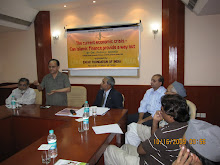http://www.miamiherald.com/opinion/letters/story/681517.html
Posted on Thu, Sep. 11, 2008
On Sept. 11, 2001, the worst terrorist attack ever to take place on American soil unfolded on live television. The United States was not alone in its grief. People across the world held prayer vigils and stood in solidarity with America. No one questioned America's declaration of war on ``terrorism.''
However, terrorism is not an ideology; it is a tactic. How does one wage a war against a tactic? That the 9/11 attacks were committed by Muslim men is one factor behind the popular perception of a causal link between Islam and terrorism. But is Islam a primary factor behind terrorism?
Osama bin Laden has a history of conflating political rhetoric with religious imagery. He has said, ``There is no more important duty than pushing the American enemy from the Holy Land.''
However, linking Islam to terrorism because of bin Laden's rhetoric is an oversimplification of a complex problem. Islam condemns terrorism. It provides a theology for peace and guidelines for living peacefully in a world with diverse people and nations. Indeed peace and justice are the foundational elements of Islam. The Koran emphasizes the sanctity of life.
It should not surprise anyone that Muslims, like people of other faiths, do not always live up to the teachings of their faith. Al Qaeda is one such group whose actions are contrary to the teachings of Islam, yet it is labeled Islamic. In the same vein, the Lord's Resistance Army in Uganda cannot be considered Christian despite claims that it is fighting for the establishment of a government based on the Ten Commandments.
Terrorism is obviously a threat, but does not necessitate a declaration of war. Military action is sometimes necessary to combat terrorism, but often it is not the best option. Addressing the grievances of the terrorists cannot automatically be dismissed as appeasement. In fact, the conversion of terrorist groups into peaceful political movements has occurred often because the group's rationale for violence has ceased to exist.
Terrorism is likely to persist. Democracies and free societies are usually vulnerable to terrorism but can protect themselves. The way forward is to engage in common-sense methods of intelligence gathering without criminalizing entire groups of people. It is to use military strategies without resorting to large-scale bombings, to end foreign occupations and to invest in an agenda that gives impoverished societies economic hope that can then lead to political freedoms.
PARVEZ AHMED, Jacksonville
Blog Archive
-
►
2014
(1)
- ► April 2014 (1)
-
►
2010
(13)
- ► December 2010 (2)
- ► April 2010 (11)
-
►
2009
(6)
- ► October 2009 (2)
- ► April 2009 (2)
-
▼
2008
(9)
- ▼ September 2008 (3)
- ► April 2008 (1)
-
►
2006
(1)
- ► October 2006 (1)

















No comments:
Post a Comment